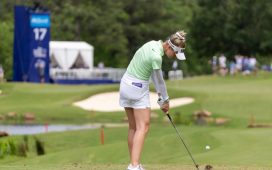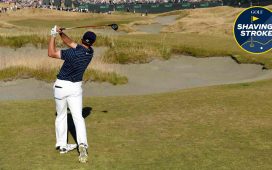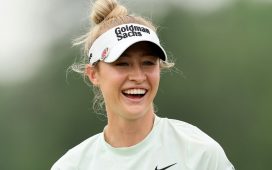Every comeback success for a PGA Tour star has an inescapable corollary in that some other struggling player will be shunted into the crosshairs of pitiless commentators who were previously focused on his now-resurgent peer. For that reason alone, Jordan Spieth ought to stand Rickie Fowler a drink when they next meet.
Like all professional golfers, Fowler is accustomed to criticism. The slings and arrows of Strokes Gained statistics will draw blood from even the very best, much less someone struggling with swing changes who has managed only four top 20 finishes in the past year. But whereas Spieth was scrutinized almost exclusively for his on-course performance, judgments on Fowler seem less about play than perception, the chaffing sense among golf fans that he is coasting down Easy Street.
Aspects of Fowler’s career certainly deserve auditing, such as his swing progress and the amount of time he devotes to servicing an apparently endless roster of sponsors. Yet he is popular among his peers, is unfailingly polite with fans, and his slump hasn’t been accompanied by churlish outbursts. He’s simply too vanilla to be polarizing, so it’s odd that it appears to be open season on Fowler for social media criticism.
First, Nick Faldo caustically tweeted that Fowler (who didn’t qualify for the Masters) could instead spend that week shooting more commercials—an audacious slap given Faldo’s own Sqairz shoe spot is about as persistent and welcome as a herpetic sore. The unveiling of the Tour’s Player Impact Program, a $40 million slush fund to bonus those deemed to most engage fans and from which Fowler is expected to benefit, further fueled grumbling that he is (in Texas parlance) all hat, no cattle.
Good news is if he misses the Masters he can shoot another six commercials that week! 😳 https://t.co/kgGcmaZUJO
— Sir Nick Faldo (@NickFaldo006) March 2, 2021
To his detractors, Fowler enjoys the trappings of superstardom without earning the trophies, his five Tour victories presented not as testament to his talent or to how difficult winning is, but instead as evidence of his supposed complacency. The harsh sentiment that Fowler receives more than he earns was heard again in the wake of news that the PGA of America has given him a special invitation to compete in this month’s PGA Championship, an event he had not otherwise qualified to play.
Yet there’s reason to view Fowler’s exemption into the field at Kiawah Island as a positive development, despite all the bellyaching about popularity contests trumping the competitive integrity of a major.
The composition of the field at major championships is always problematic—too many knackered old warhorses cluttering up the paddock; too many quality players sidelined for a no-hoper who got hot for 36 holes on a wet Monday in Columbus, Ohio; too many slender résumés playing thanks to out-of-the-way qualifiers. Special exemptions into the field are particularly fraught. The USGA has granted dozens of free rides into the U.S. Open since Ben Hogan received the first in 1966, but the criteria for such an exemption has remained largely unchanged, if unacknowledged.

Rickie Fowler prepares to play his shot from the 14th tee during the second round of Valero Texas Open. (Photo by Steve Dykes/Getty Images)
Special invitations to majors typically have more to do with sentimentality than competitiveness, honoring an aging veteran with a lap of honor. The record books show one outlier: Hale Irwin, who won the ’90 U.S. Open as an invitee. He was 45 years old, a two-time champion in the ‘70s, five years removed from his last victory, in middling form and with a world ranking in the high 90s. Like Hogan and Snead and Palmer before him, Irwin was thought a ceremonial figure when the week began. Of the 34 invites handed out by the USGA since ’90, just one went to a man who could realistically have been considered competitive: Michael Campbell, in 2000, a year during which he won twice overseas.
The two special invitations extended for the PGA Championship—to Fowler and John Catlin, an American who has won three times on the European Tour since September—represent a welcome break from the ceremonial convention. These aren’t past champions in the sunset of their careers or men with a nostalgic history at the venue. Catlin and Fowler, even with his current struggles, are both better bets to contend at Kiawah Island than dozens of players already in the field. These exemptions acknowledge the fluctuating ebb and flow of form among still-competitive players, and while a case can be made for others equally deserving of the free pass, it’s at least a better use of invites than letting a now-lame former thoroughbred canter around for a couple of days with no chance of making the weekend.
The level of resentment directed at Fowler probably won’t be as much in evidence next month when Phil Mickelson—currently two spots below Fowler in the world ranking—needs a special invitation to the U.S. Open at Torrey Pines. The USGA will almost certainly offer him a spot at the event that has in some ways defined his career, thanks to his six silver medals. They should, and he should accept. It’s an appropriate gesture for a man who bridges sentimentality and competitiveness, a legend who still has game, though probably not enough to complete the career grand slam with a U.S. Open win.
Special exemptions into golf’s premier tournaments will never not be contentious, but the one expected for Mickelson at age 51 and the one extended to Fowler at 31 are defensible moves. And, in the case of the latter, encouraging even.








